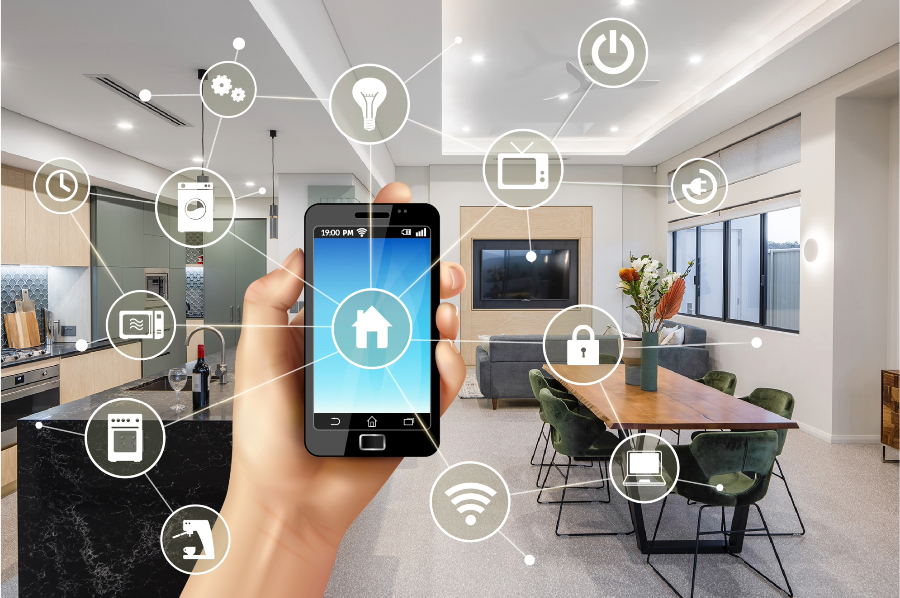The Transformative role of AI and IoT in smart homes
Our homes are becoming increasingly intelligent as a result of the Internet of Things (IoT) and artificial intelligence (AI) coming together in this era of rapid technological innovation. Our houses are now more efficient, secure, and convenient than ever because of these two potent technologies, which are altering the way we live.
The foundation of smart homes
IoT, a network of interconnected systems, appliances, and devices that can communicate with one another and be controlled remotely through the internet, is at the center of the smart home revolution. This structure is enhanced by AI by including an intelligent layer that analyzes data, makes judgments, and gains knowledge from user behavior. Smart homes may adapt to our wants and tastes thanks to the IoT and AI that work together as its foundation.
Enhancing home Automation
Home automation is one of the main functions of AI and IoT in smart homes. With the help of these technologies, we can automate a variety of processes, such as regulating the temperature, turning off the lights when we leave the house, and locking the doors. AI algorithms leverage information from human interactions and IoT sensor data to generate personalized automation routines that save energy consumption, boost security, and simplify daily life.
IoT sensors, for instance, can recognize your presence as you enter your smart home and instantly change the lights, temperature, and music to your preferred settings. As a result, your house will always be cozy and pleasant. AI can learn your routines and anticipate your requirements.
Energy Efficiency and Sustainability
The promotion of sustainability and energy efficiency in smart homes is significantly aided by AI and IoT. IoT sensors have the ability to connect to smart appliances and communicate with them to monitor energy usage in real time. In order to make preemptive modifications, such as changing the temperature to save energy without compromising comfort, AI systems can examine historical data and weather forecasts.
Smart homes can also incorporate renewable energy resources into the grid, such as solar panels. AI is capable of effectively managing the energy produced by various sources, selling extra energy back to the grid when costs are high, or sending excess energy to storage. In addition to lowering energy costs, this promotes a more sustainable future.
Enhancing Security and Safety
Homeowners are most concerned about security, and AI and IoT have greatly enhanced home security systems. Smart cameras, doorbell cameras, and motion detectors are examples of IoT sensors that offer real-time property monitoring. Family members and prospective intruders may be distinguished using AI-powered facial recognition and behavior analysis, which can then send alerts and take appropriate action.
Additionally, homeowners have peace of mind and control over their home security from anywhere in the world thanks to smart locks and security systems that can be monitored and controlled remotely using smartphone apps. An additional layer of defense against threats can be added by using AI algorithms to examine patterns in sensor data to spot anomalies.
Remote Monitoring and Control
Remote monitoring and control of your house is one of the unique characteristics of smart homes driven by AI and IoT. You can use a smartphone app or online interface to access your smart home systems whether you’re at work, on vacation, or just gone for the day.
With the help of this remote access, you may monitor security cameras, change the temperature, lock or unlock doors, and even get notifications and alerts if something out of the ordinary occurs in your home. Smart homes are a great option for people who travel frequently or want to keep a close check on their property since it offers a sense of security and control that was previously unattainable.
Challenges and Considerations
While there are many advantages to the combination of AI and IoT in smart homes, there are also difficulties and things to take into account. The collection and use of data by smart devices raise serious privacy concerns. Homeowners must use caution when disclosing private information and make sure that their networks and gadgets are protected.
Another issue is interoperability because different manufacturers develop IoT devices using multiple communication protocols. It might take more time and money to make sure these technologies can operate together without a hitch. Additionally, because of their reliance on technology, smart homes are open to cybersecurity risks, so owners must take precautions to shield their systems from hackers.
Conclusion
In conclusion, AI and IoT play a transformational role in smart homes, improving every part of our daily lives. These innovations enhance the efficiency, security, and personalization of daily life while also advancing health, sustainability, and energy efficiency. To fully benefit from the advantages of the connected house of the future as the smart home ecosystem continues to develop, it’s critical for homeowners to adopt these technologies responsibly while addressing privacy and security issues. Our houses are becoming more perceptive and responsive to our needs thanks to AI and IoT, making our lives more comfortable and enjoyable than ever.
Source
- https://teksun.com/blog/how-ai-and-iot-are-transforming-smart-homes/
- https://www.techhive.com/article/583408/smart-home-guide-for-beginners-how-to-make-your-home-more-convenient-to-live-in.html
- https://www.techtarget.com/iotagenda/definition/Internet-of-Things-IoT
- https://www.britannica.com/technology/artificial-intelligence
- https://www.se.com/in/en/work/products/product-launch/smart-home-automation-wiser/

